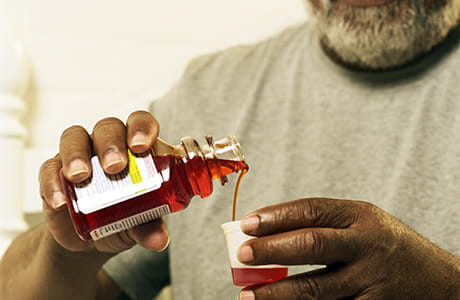Could erectile dysfunction be a sign of heart disease?
It may surprise you, but taking care of your heart improves your sexual health, too.
Most men don’t want to talk about it. Or think about it. And they certainly don’t want to admit it to their friends or doctor. It’s embarrassing, and many believe it’s a psychological issue. What are we talking about? Erectile dysfunction, or ED, the inability to get and keep an erection firm enough for sex.
The fact is, we need to talk about it. While it’s not uncommon for men to have a problem with erections from time to time, ongoing ED can cause stress and relationship issues. It also negatively impacts men’s self-confidence and quality of life. Plus, it can be much more than a “down there” problem.
In fact, Ryan Mori, MD, a urologist at Geisinger, says ED can be an early warning sign of heart disease.
How are heart disease and ED connected?
“The penis is the window to the cardiovascular system, and ED can be a sign of declining heart health and vice versa,” he says. “Erections are very complex. They require an orchestration of the entire body to have things working perfectly together. It needs perfect blood flow, and the blood vessels need to be healthy.”
During sexual arousal, nerves release chemicals that increase blood flow into the penis, where muscle tissue traps the blood to make the penis firm. Once a man orgasms, nerve signals cause the muscle tissues to contract, blood is released and the erection relaxes.
That’s why sexual health and cardiovascular health are so intimately connected, adds George Ruiz, MD, chief of cardiology at Geisinger.
“The heart and the penis share a series of pipes that connect the two, and any damage to these arteries can impact both heart health and sexual health,” he says. “Flow of blood is the currency of life and without it, we can’t do the things we want to do. If there’s a problem with the flow, it will be difficult to develop an erection. No flow, no grow!”
So, don’t be shy about discussing your concerns with your doctor. It’s a matter of your health! Knowing the ins and outs of the link between the two can not only improve your heart health, but your sex life, too — should the occasion arise.
What can impact blood flow to the penis?
Although ED has several causes, including low testosterone and some medications, narrowing of the arteries as men age is the most common reason. Known as atherosclerosis, this common condition develops when plaque builds up inside the artery walls due to cholesterol, fat, blood cells and other substances in the blood. When the plaque builds up, it causes the arteries to narrow and reduces the supply of blood to the penis and other organs.
There are many risk factors that can lead to artery damage, including:
- High blood pressure
- High cholesterol
- Diabetes
- Obesity and sedentary lifestyles
- Drug and alcohol use
- Smoking
“There are many risk factors that lead to artery damage. That not only affects vital sexual organs, but also vital organs throughout the body,” says Dr. Ruiz. “These same risk factors can also lead to ED.”
Can I reduce my risk factors for erectile dysfunction?
Treatment for ED starts with lifestyle changes to take care of your heart. Fortunately, healthy lifestyle choices can make a big impact on ED — as well as your heart health. You can reduce your risk factors for heart disease and ED by:
- Exercising regularly, aiming for about 30 minutes of physical activity five days a week
- Eating a balanced, nutritious diet that includes fresh fruits and veggies, lean meats, low-fat dairy and healthy fats, such as salmon, olive oil and avocados
- Maintaining a healthy weight
- Quitting smoking
- Controlling high blood pressure and high cholesterol
- Managing diabetes
- Reducing stress
“Lifestyle changes can significantly improve sexual health,” adds Dr. Ruiz. “Prevention is best, and the next best thing is identifying risk factors and aggressively managing them to help preserve vascular health and, consequently, erectile function.”
What erectile dysfunction treatments are available?
If lifestyle changes aren’t enough, there are several treatments available. Consult with your doctor on which treatment is right for you, depending on your unique circumstance and health status.
Oral medication
The most common first step in treatment is medication. Most commonly, doctors prescribe drugs, such as Viagra, Levitra and Cialis. These medications work by dilating blood vessels that supply blood to the penis. However, with most drugs, they can cause side effects, such as facial flushing, heartburn or headache, and serious complications, in some cases. If you’re taking nitrates for your heart, you should not take these medications.
Injections or suppository medications
Another option is self-injection therapy. You can inject a drug into the side of the penis using a very fine needle to produce an erection, which can last about 30 minutes. The most common side effect is a prolonged erection.
In addition, intraurethral therapy, where you use a special applicator to insert a tiny suppository into the penile urethra, can be a successful drug treatment. An erection normally starts within 10 minutes and can last between 30 and 60 minutes. A common side effect is a burning sensation in the penis.
Mechanical devices
Mechanical devices, such as a vacuum erection device, can help to pull blood flow into the penis to produce and keep an erection.
It works by placing a hollow tube over your penis, and then using the pump to suck the air out of the tube, creating a vacuum. Once you get an erection, you then place a tension ring around the base of your penis to hold in the blood and keep an erection for up to 30 minutes. Remove the ring after intercourse to release the blood back into circulation.
Surgery
If you’ve tried all other treatments with little success, surgically placing a prosthetic into the penis is the next best step. The implants consist of either inflatable or bendable rods to keep the penis firm, and helps you control when and how long to have an erection. But as with any surgery, it comes with risks. Talk to your doctor if surgery is right for you.
“There are many things we can do, and I like to think of treatment like walking up a ladder,” says Dr. Mori. “You don't start at the top first. You step on the first rung of the ladder, and that is almost always getting your lifestyle — and heart health — in check.”
Next steps:
Learn about erectile dysfunction treatment at Geisinger
6 heart symptoms you shouldn’t ignore
Why yearly exams are key to better health





